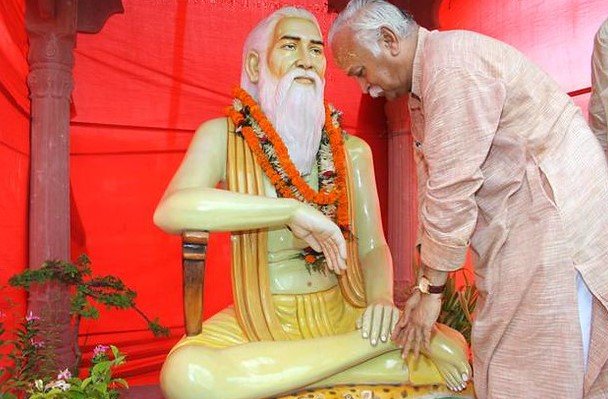Speaking in Delhi, Bhagwat slams materialism, questions Western progress, and claims India’s ancient vision holds the key to peace, equity, and human fulfillment
In a speech that blended cultural conviction with sharp global commentary, RSS chief Mohan Bhagwat on Tuesday claimed that the only lasting solution to the world’s worsening crises lies in Bharatiyata — or “Indianness.” His words drew both applause and critique across ideological lines.
Standing at the Dr. Ambedkar International Centre in New Delhi, Bhagwat didn’t just promote national pride. He suggested that global despair — from economic injustice to looming wars — could only be resolved by embracing what he described as India’s timeless spiritual worldview.
“World’s chasing progress, but sorrow hasn’t left”
Bhagwat, 74, opened his remarks with a sobering critique of modernity. Scientific and economic advances, he argued, have created gadgets, comfort, and speed — but not peace.
“We thought material success would bring happiness,” he said, “but sorrow is still everywhere.”
And then came the pivot.
“People are now looking towards Bharat because the Western formula has failed. The world is beginning to see that something’s off with how we’ve been living.”
He didn’t just mean failed policies. He meant an entire philosophical approach to life.
Bharatiyata ≠ Citizenship
A crucial point Bhagwat stressed was that Bharatiyata — often mistranslated or misunderstood — isn’t about legal identity.
“It’s not citizenship,” he said. “Bharat’s essence lies in dharma drishti — a way of seeing life based on duty, balance, and interconnectedness.”
He emphasized that this isn’t about religion in a narrow sense, nor nationalism in the Western mold. Rather, it’s about how one relates to society, to nature, and to the deeper meaning of being human.
“It’s the lens through which we see our responsibilities,” he said.

A World Haunted by War and Division
Bhagwat didn’t shy away from global references. He pointedly reminded the audience how Western-led peace efforts — including the League of Nations and the United Nations — haven’t prevented wars.
“After World War I, we wrote books, formed bodies. Then came World War II. Now we’re scared of a third one,” he said.
His voice grew sharper as he accused modern systems of worsening inequality.
-
“Exploitation increased.”
-
“Poverty increased.”
-
“The gap between rich and poor widened.”
Each phrase landed with a thud in the hall, drawing murmurs from the audience.
What Exactly Is Bharatiyata?
Though Bhagwat didn’t offer a checklist, his references made it clear:
-
Self-restraint over indulgence
-
Service over consumption
-
Harmony over dominance
-
Inner fulfillment over outward conquest
And most importantly, he said, truth above convenience.
He lamented how “truth is now defined by who controls the narrative,” warning that such distortion fuels conflict and moral erosion.
Critics Call It Cultural Spin, Supporters See Vision
Predictably, reactions to his speech split down familiar lines.
A Delhi University professor of political science called it “another exercise in cultural projection.”
“Mohan Bhagwat speaks of ancient wisdom but overlooks how plural and contested ‘Indianness’ really is,” she said. “There’s no one definition.”
But RSS insiders and allies saw his speech as timely.
“Western models of growth have failed us. The environment’s wrecked. Families are breaking down. People are depressed,” said an RSS functionary. “Is it wrong to ask if India’s civilizational values offer a better way?”
Universities and Civil Bodies Listen In
The event, jointly organized by IGNOU and the Akhil Bharatiya Anuvrat Nyas, was the 10th edition of the “Anuvrat Nyas Nidhi Vyakhyan.” And despite being an RSS-centered event, it drew a broader academic crowd.
IGNOU Vice-Chancellor Prof. Nageshwar Rao, who was present on stage, nodded frequently during Bhagwat’s speech. “It’s important that young people hear this perspective,” he said later.
A few students present were less enthused.
“Fine, materialism has problems,” said a postgraduate literature student. “But don’t use that to wrap up a whole ideology and call it the answer to everything.”
This Isn’t New for Bhagwat — But the Tone Is
This isn’t the first time Mohan Bhagwat has pitched Bharatiyata as a global template. But observers noted that this time, his tone was more urgent, even anxious.
“There was a time when the RSS message was more India-focused,” said political analyst Rasheed Kidwai. “Now, they’re clearly trying to globalize their message.”
He added, “It’s part idealism, part soft-power strategy.”
And it comes at a time when India is pushing cultural diplomacy globally — from yoga and Ayurveda to digital infrastructure and Vedic philosophy — all while claiming its spot at major geopolitical tables.
Rising in Cultural Context, Not Isolation
What gives Bhagwat’s comments more weight today is the cultural churn worldwide. As the West wrestles with its identity crises — from race tensions to political polarization — alternative civilizational voices are gaining traction.
China’s Confucian revival. Russia’s Orthodoxy-infused nationalism. Turkey’s Ottoman-era nostalgia.
India, too, is in the mix. And Bharatiyata, with its focus on spiritual plurality and ecological balance, offers a narrative that some believe could appeal beyond borders.
But the challenge, as critics warn, is keeping this narrative inclusive.
